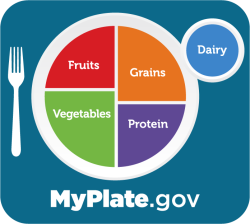Nutrition for Preschool-aged Children

Preschool-age children (ages 4 to 5) are still developing their eating habits and need encouragement to eat healthy meals and snacks. These children are eager to learn, especially from other people, and will often imitate eating behaviors of adults and other kids. They need supervision at mealtime, as they are still working on chewing and swallowing skills.
Balanced Nutrition is Key
It’s important for preschoolers to eat a variety of foods from all food groups. MyPlate.gov can be a helpful tool in planning your preschooler’s meals.

When preparing your child’s plate, try to include the following:
- Fruits and vegetables: Aim to serve them 1 ½ cups of fruits and 1 ½ cups of vegetables every day.
- Protein: Offer a variety of protein sources, including some plant-based protein sources like beans, nuts/nut butters and legumes.
- Grains: Aim to make half of their grains whole grains. Choose to serve options that have limited amounts of added sugars, saturated fat and sodium.
- Dairy: Serve low-fat or fat-free dairy-based milks and yogurt, or lactose-free or fortified soy alternatives.
What to Do if Your Preschooler is a Picky Eater
Tried it all but your 4-year-old still won’t eat broccoli? Even with the best planning, picky eating is common at this age. An important thing to note is that it can take 15-20 exposures for a child to start to accept a new food. If your child doesn’t like a new food initially, keep offering it to them alongside foods they do like.
Avoid force-feeding your child or scolding them for not eating a certain food, as this can actually make picky eating worse.
Remember that kids love to mirror what they see. To help children create healthy eating habits, parents need to lead by example. Preschoolers mimic what they see their parents doing. If parents don’t have healthy eating habits, their children will have a harder time developing healthy eating patterns.
If you are concerned your preschooler is not eating a balanced diet or getting proper nutrition, discuss it with your child’s pediatrician.












